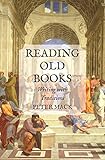Reading Old Books : Writing with Traditions / Peter Mack.
Material type: TextPublisher: Princeton, NJ : Princeton University Press, [2019]Copyright date: ©2019Description: 1 online resource (256 p.) : 1 b/w illusContent type:
TextPublisher: Princeton, NJ : Princeton University Press, [2019]Copyright date: ©2019Description: 1 online resource (256 p.) : 1 b/w illusContent type: - 9780691194004
- 9780691195353
- Influence (Literary, artistic, etc.)
- LITERARY CRITICISM / Comparative Literature
- Aeneid
- Alcina
- Allegory
- Allusion
- Awareness
- Belphoebe
- Bradamante
- Canzone
- Chinua Achebe
- Cino da Pistoia
- Classical Latin
- Colonialism
- Copying
- Creative writing
- Criticism
- Cynicism (philosophy)
- Cyprian Ekwensi
- Determination
- Divine Comedy
- Dolce Stil Novo
- Elizabeth Gaskell
- English literature
- English novel
- English poetry
- Epic poetry
- Fabliau
- Fiction
- Flattery
- Font Bureau
- Genre
- George Eliot
- Il Filostrato
- J. (newspaper)
- Jean de Meun
- John Donne
- Latin poetry
- Lecture
- Literary criticism
- Literature
- Long poem
- Ludovico
- Lyric poetry
- Marfisa
- Mary Barton
- Matthew Carter
- Misery (novel)
- Modernity
- Narration
- Narrative
- New Departure (Democrats)
- Novelist
- Oral tradition
- Orlando Furioso
- Ovid
- Pandarus
- Petrarch
- Petrarchan sonnet
- Philomena
- Pierre Simon Fournier
- Pity
- Poetic tradition
- Poetry
- Politician
- Prejudice
- Proverb
- Roman de la Rose
- Ruggiero (character)
- Ruler
- Satire
- Scotch Roman
- Sestet
- Slavery
- Soliloquy
- Sonnet
- Stanza
- Storytelling
- Suggestion
- The Canterbury Tales
- The Decameron
- The Earthly Paradise
- The Faerie Queene
- The Knight's Tale
- The Other Hand
- The Regime (novel)
- The Spanish Tragedy
- Tradition
- Traditional African religion
- Troilus and Criseyde
- Troilus
- Troubadour
- Typeface
- Understanding
- V
- Virgil
- William Shakespeare
- Wizard of the Crow
- Wole Soyinka
- World literature
- Writer
- Writing
- 801.3 23
- PN56.T72 M3 2020
- online - DeGruyter
| Item type | Current library | Call number | URL | Status | Notes | Barcode | |
|---|---|---|---|---|---|---|---|
 eBook
eBook
|
Biblioteca "Angelicum" Pont. Univ. S.Tommaso d'Aquino Nuvola online | online - DeGruyter (Browse shelf(Opens below)) | Online access | Not for loan (Accesso limitato) | Accesso per gli utenti autorizzati / Access for authorized users | (dgr)9780691195353 |
Frontmatter -- Contents -- Preface -- Introduction. Ideas of Literary Tradition -- Chapter one. Petrarch, Scholarship, and Traditions of Love Poetry -- Chapter Two. Chaucer and Boccaccio’s Il Filostrato -- Chapter Three. Renaissance Epics: Ariosto, Tasso, and Spenser -- Chapter Four. Reading and Community as a Support for the New in Elizabeth Gaskell’s Mary Barton -- Chapter Five. European and African Literary Traditions in Ngũgĩ wa Thiong’o’s Wizard of the Crow -- Conclusion. Writers’ and Readers’ Traditions -- Notes -- Select Bibliography -- Index
restricted access online access with authorization star
http://purl.org/coar/access_right/c_16ec
A wide-ranging exploration of the creative power of literary tradition, from Chaucer to the presentIn literary and cultural studies, "tradition" is a word everyone uses but few address critically. In Reading Old Books, Peter Mack offers a wide-ranging exploration of the creative power of literary tradition, from the middle ages to the twenty-first century, revealing in new ways how it helps writers and readers make new works and meanings.Reading Old Books argues that the best way to understand tradition is by examining the moments when a writer takes up an old text and writes something new out of a dialogue with that text and the promptings of the present situation. The book examines Petrarch as a user, instigator, and victim of tradition. It shows how Chaucer became the first great English writer by translating and adapting a minor poem by Boccaccio. It investigates how Ariosto, Tasso, and Spenser made new epic meanings by playing with assumptions, episodes, and phrases translated from their predecessors. It analyzes how the Victorian novelist Elizabeth Gaskell drew on tradition to address the new problem of urban deprivation in Mary Barton. And, finally, it looks at how the Kenyan writer Ngũgĩ wa Thiong'o, in his 2004 novel Wizard of the Crow, reflects on biblical, English literary, and African traditions.Drawing on key theorists, critics, historians, and sociologists, and stressing the international character of literary tradition, Reading Old Books illuminates the not entirely free choices readers and writers make to create meaning in collaboration and competition with their models.
Mode of access: Internet via World Wide Web.
In English.
Description based on online resource; title from PDF title page (publisher's Web site, viewed 25. Jun 2024)


